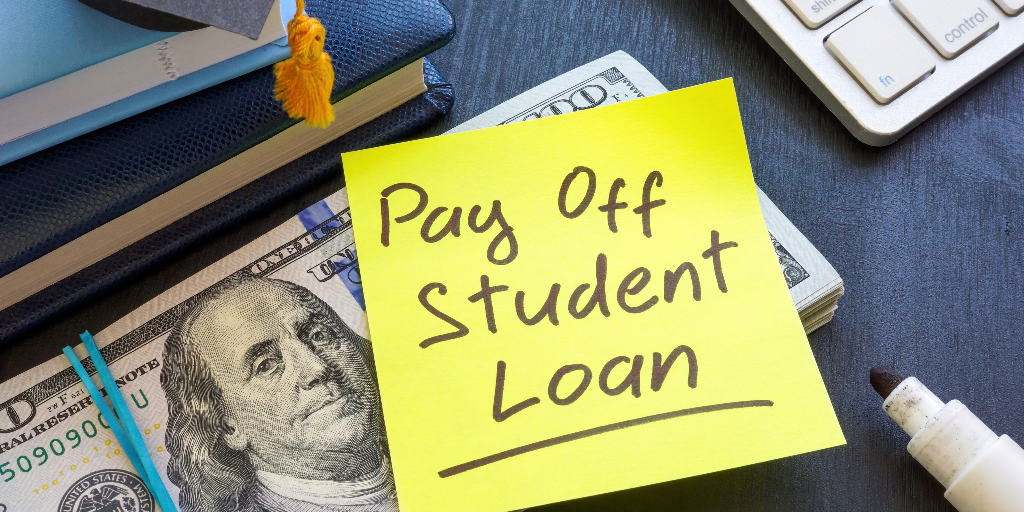The Starter Guide to Pay Back Your Student Loan Debt

- If you want to start paying off your student loans soon, then you need to set a goal and build your plan around it.
- A budget based on your spending will help you pay off your student loan debt.
- The thought of paying off student loan debt can be stressful enough. By having a plan, you can decrease your stress and feel more in control of your money.
Student loans can be a touchy subject for many people. If you recently graduated college, you want to enjoy post-graduation life before thinking about paying back Sallie Mae. But ignoring your debt can make you feel better temporarily, but it doesn’t make it disappear. The sooner you can evaluate your financial situation, the better you will feel about yourself and your money.
One way to start by paying your student loans back in an affordable way is to begin a student loan repayment plan. Starting your student loan repayment journey can be challenging at first; I mean, who likes paying back borrowed money?
However, it’s a must to reflect on your finances now because it can help the state of your finances in the future. So if you’re looking to pay back your student loans sooner rather than later, outlined below is a starter pack to help get you off on the right foot.
Set a Goal and Plan
The first thing to do when setting out to repay your student loan debt is to set a goal. It is easy for student loans to get pushed to the bottom of the list. You have your job to worry about, finding an affordable place to rent, eating a somewhat healthy diet, drinking enough water, looking good on the ‘gram, well, you get the picture. There are a lot of things vying for your time and money.
Making a plan will allow you to prioritize the most important things in your life. A plan puts you into the driver’s seat of your life instead of leaving your life up to chance or circumstance.

So how do you make a plan? First, set a goal. You need to begin with the end in mind. How soon would you like to be student loan debt free? 2 years? 5 years? 10 years? This number can be arbitrary at first. There is no shame in changing your goal later, but you must start somewhere.
Then, you ask yourself the right questions and be realistic with your answers. Here are a few questions to get you started:
- How much would you need to pay every month to become debt free by that time?
- Will paying the minimum get you there?
- What programs could help you get there?
- Should you hold your loans as-is or try to refinance them?
Once you’ve answered these questions, you now have a starting point to set a goal and make a plan. In general, your goal will have two components, utilizing the new debt relief program if you can and putting every available dollar towards paying off your student loan debt.
Do You Qualify for Student Loan Debt Relief?
It is an easy decision to use a debt relief program to pay off your student loan debt. If you were given the choice between paying off your student loans or qualifying for debt relief, you would choose the latter. However, many people assume that they don’t qualify and don’t even pursue it.
For example, one of the most well-known student loan forgiveness programs, Public Service Loan Forgiveness (PSLF), is for anyone who works for a public service employer and has nothing to do with what your job is. A nurse and a housekeeper working at a qualifying hospital would both be eligible for the benefit as long as they meet all of the requirements.
Other student loan debt relief programs that you may qualify for include Teacher Loan Forgiveness, Income Drive Repayment (IDR) Plans, Military Service, AmeriCorps, Disability Discharge, Perkins Loans Cancellations, and more.
Research Qualifying Student Loan Forgiveness Programs
Take 30 minutes to research various student loan forgiveness programs that fit your employment and financial situation, and if you’re still unsure, talk to a certified student loan planner.
As a word of caution, while you may qualify for deferment or forbearance, that doesn’t mean that these are your best options. Make sure that you’ve researched all of the implications of deferment and forbearance, including the impact on your credit and the interest you will pay, before using one of those programs.

Add Paying Off Your Student Loan Debt in Your Budget
Now that you know how much you need to pay and you know what kinds of programs you’ll qualify for to help you with your student loans, it is time to find the money to make those payments. That is where creating a budget comes into play.
Yes, the “B” word. Budgeting is the only way to ensure that you have the money you need to meet your goal. Budgeting is not meant to be a restrictive prescription of what you can and can’t do. It isn’t a financial diet. Instead, it is a guide to how you use your money to ensure you have enough to spend on what matters to you. If you don’t have twinkies in your budget because they’re really not that good, why do you keep buying them? Instead, focus on what matters to you. That way, you can spend on what matters while still having enough to pay off your student loans.
People hate budgeting because making an arbitrary budget is frustrating, and it always falls apart. Instead, try tracking your spending for a few months to get an idea of what you spend money on, and deliberately decide what you want to cut back, then create a budget accordingly. Now you have the money to pay down your student loans every month. Even if you are making small payments toward your student loan debt, that’s a big win because it will help you become debt-free.
Reduce Stress Around Paying Off Debt
Lastly, stressing about your student loans on top of your job, house, bills, and adulting, isn’t going to help. Once you have a plan in place, know that you are making progress as fast as you need to, and there is nothing to worry about. If you get thrown off track, readjust and move forward accordingly.
There is no sense in letting your stress get the better of you in your debt payoff journey. You can pay off your student loan debt with discipline and the right money mindset. Once your debt is paid off, you will know it was all worth it!
The Money Wrap-Up
If you avoid paying off your student loans, it can cost you time and money. To pay off your student loan debt, start by setting a goal of when you want it paid off and make a plan to achieve your goal. Next, determine if you qualify for debt relief—there is no point in paying more than you have to. Then, build a budget around your spending that includes your debt payoff so that you know you have the money to meet your goals.
Lastly, stop stressing about your student loan debt. Once you’ve followed the steps outlined above, your debt payoff is assured. You can do this!